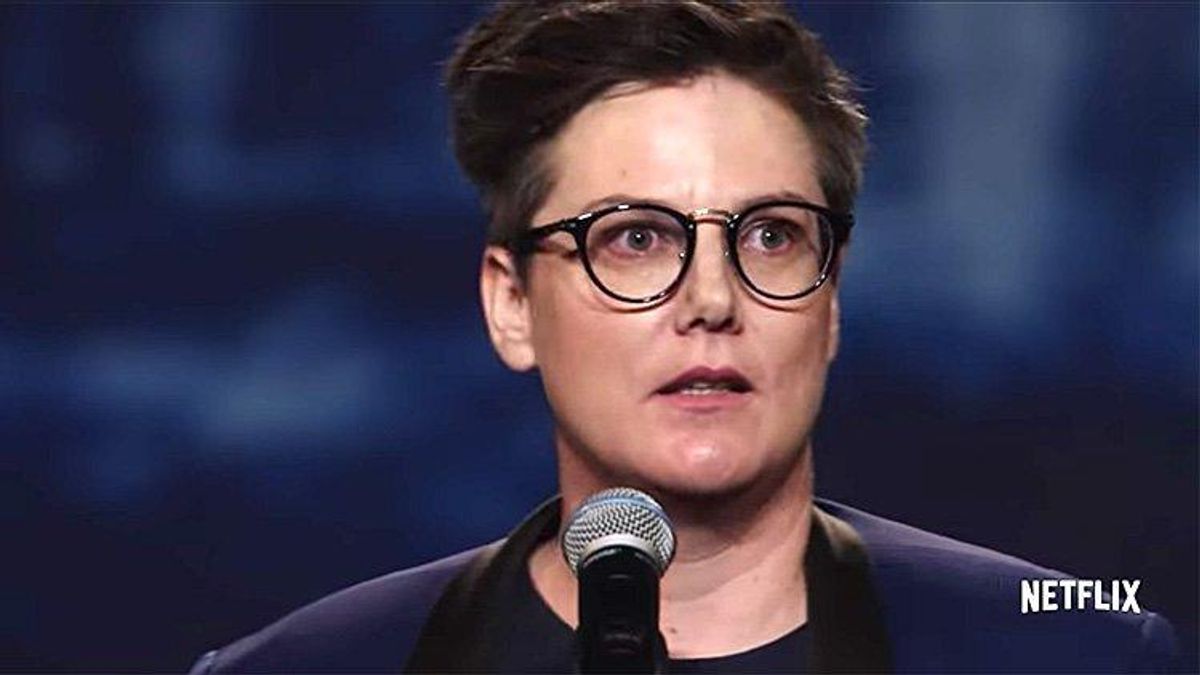Entertainment
Hannah Gadsby’s Nanette Is a Sea Change for LGBT Comedy
Hannah Gadsby’s Nanette Is a Sea Change for LGBT Comedy

By continuing to use our site, you agree to our Privacy Policy and Terms of Use.
Hannah Gadsby’s Nanette Is a Sea Change for LGBT Comedy
Hannah Gadsby’s Nanette Is a Sea Change for LGBT Comedy

I first watched Hannah Gadsby’s Nanette right after it first appeared on Netflix, under my radar and without much buzz. All I knew was the image in the tile: It was a new-to-me lesbian comedian in a fetching suit with a comedy special that Netflix thought was good enough to put at the top of my algorithm. Something similar must have happened with a few other viewers, because before I knew it, Hannah Gadsby became the single most important comedian in the world, the one everyone is talking about. “Have you seen ‘Nanette’ yet?” How refreshing it is that quality can still carry the day when sometimes it seems hype is the only currency in streaming.
Related | 17 of the Best LGBT Films of 2018
It’s been a few weeks and I haven’t stopped thinking about Nanette ever since. For the uninitiated: Nanette is not about someone named Nanette. That’s the first joke that Hannah Gadsby gets out of the way: She met a peculiar barista named Nanette who she thought was interesting enough to write a show about - gave the name of the show to the first festival to book it - and sat down and something very different came out. The show was a hit, toured the world, and was taped before thousands in the Sydney Opera House.
The end result - a word-of-mouth smash Netflix special - is a one-woman sea change for LGBT comedy, and a necessary moment in the conversation about identity and the arts. Gadsby begins with twenty-or-so minutes of comfortable, familiar lesbian humor. She lands some clever jokes about pride parades, feedback from lesbian audiences, and living in the world with a butch appearance. Once, she says, when mistaken for a gay man, she faced a street confrontation with a homophobe who, upon closer inspection, read her as a lesbian and then decided on principle not to beat her up because he doesn’t hit women: “What a guy!”
Then something very strange indeed happens. With a decade of work in this vein behind her, Gadsby says she must quit comedy. Silence from the audience. And then, without a moment of pretension or pedantry, and without boring us for a moment, Gadsby spends nearly an hour explaining how a joke works, and why it just doesn’t work for her anymore. Jokes, she says, are created when tension is exploded by a punch line, and the marginalized comic creates that tension by stating the trauma and then - “What a guy!” - letting the audience off the hook, popping the balloon. Gadsby remarks eloquently of this practice: “It’s not humility. It’s humiliation.”
The implicit question: What is the responsibility of the audience - presumably straight - when the queer comic puts forward the trauma. Gadsby has the answer, but she’s going to make you work to get there. She’s going to sit you down and give you an art history lesson, connecting the history of cubism to the #metoo movement, and then bring it home with a bravura rant linking Van Gogh’s sunflowers and harmful myths to the glorious suffering of artists. She is herself a lesbian artist who suffered to cultivate her identity against long odds in conservative Tasmania, and she’s going to tell you her story of self-discovery - including what really happened with that homophobe on the street - and you’ll get up from the futon unable to watch another stand-up special. At least, not for a while, and never again quite the same way.
This is all because for the first time we see what happens when a comedian states the trauma and leaves it there. What happens when you forgo the punchline? It doesn’t go down easily. But it is a necessary experiment. Material this combustible must be handled with care, and Gadsby is a master of her medium. She gives the impression of someone who has learned from every hour of her stage time over a successful career. She handles the audience beautifully, generously walking us through a turbulent introspection at great length without once losing control of the room. So precise is the writing and so honed is the delivery that I don’t believe Gadsby even once takes the microphone off the stand to work the stage with her formidable charisma.
I’m excited to see what happens next for Hannah Gadsby, and for comedy writ large. Not unlike Joyce and Woolf in the novel or Pirandello in the theater, she has pulled back the curtain to show us how the gears of the apparatus are turning, and Nanette makes clear that comedy’s marginalized practitioners are still obligated to fuel the machinery with their pain. By quitting comedy and telling us why, Hannah Gadsby has discovered uncharted waters where all of her peers will have to sink or swim.